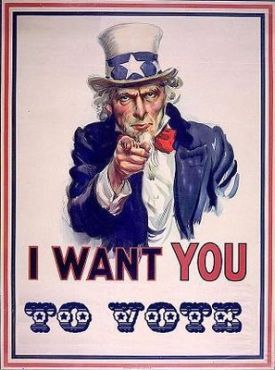State Laws Frequently Require Employers to Allow Employees to Miss Some Working Time on Election Day to Vote
With Election Day coming soon, employers may confront employee requests for time off to vote. Some employees may even expect their employer to allow them to miss work with pay while they go to the polls. The laws regarding time off from work to vote vary by state. Most states require employers to allow employees to miss working time to vote, only if their workers have less than a stated number of uninterupted non-working hours while the polls are open. Some states oblige employers to pay their employees that take statutory voting leave, but others do not. Employers that violate these laws face criminal prosecution for a misdemeanor, which may subject them to fines and incarceration of a year or less.
Both Illinois and Missouri Have Similar Election Day Voting Leave Requirements
In both Illinois and Missouri, statutes oblige employers to allow an employee time off to vote on election day if her or his working hours overlap with the hours of the polls’ operation in some instances. Illinois Voter Leave Law; Missouri Voter Leave Law. In Illinois, an employer must grant a voting leave for a maximum of two hours, unless the employee has at least two hours during which the polls are open before her or his working hours start or the polls remain open for at least two hours after her or his working hours end. Missouri imposes a similar obligation on employers, unless the polls are open for three uninterrupted hours either before or after the employee’s working hours. In both states, the polls open at 6:00 a.m. and close at 7:00 p.m. (Central Standard Time). Both states only require employers to provide statutory voting leaves if an employee makes a request for such leave before Election Day. If an employee makes a valid request for voting leave, then the employer may determine the specific hours that she or he takes for voting leave under both the Illinois and Missouri laws. Employers in either state, furthermore, must pay employees who take statutory voting leaves.
For example, suppose an employee’s work shift starts at 7:30 a.m. and ends at 4:30 p.m. If the employee works in Illinois, the polls open an hour and one-half before her or his work shift starts, but her or his shift ends two and one half hours before the polls close. Thus, the employee has no right to take a statutory voting leave. If, however, an employee with a Missouri workplace has the same work shift, then the hours of the polls’ operation allow no uninterrupted period of three hours in which to cast her or his vote. Hence, the Missouri employee has a right to take a paid voting leave. The employer, however, has the right to set the hours during which the employee may take the leave. To minimize the amount of time that the employer pays the employee to vote, it would direct the employee to leave work at 4:00 p.m. and pay her or him until 4:30 p.m. Doing so would give the employee three uninterrupted hours during the polls’ hours of operation in which to vote.
Do Employees Have a Right to Statutory Voting Leave If They Vote During Early Voting Instead of On Election Day?
Unlike Missouri, Illinois allows early voting between October 22, 2012 and November 3, 2012. The Illinois Legislature authorized early voting long after the it had adopted the statute regarding paid voting leaves. The early voting statute says nothing about statutory voting leaves. It also sets distinct voting hours for early voting, namely either 8:30 a.m.-4:30 p.m. or 9:00 a.m.-5:00 p.m. on weekdays and 9:00 a.m.-12:00 p.m. on Saturday, Sunday, and holidays. Illinois Early Voting. Arguably, with early voting available on both weekdays and weekends, most employees will have two uninterrupted hours available for early voting outside of their working hours. Since the statutory voting leave law allows the employer to designate the hours for such leaves, it will ordinarily instruct employees requesting leave to vote to do so on one of the employee’s non-workdays or on Election Day. An employer, however, may always do more than the law requires voluntarily. Consequently, it could give an employee that works weekdays between 7:30 a.m. and 4:30 p.m. and requests paid voting leave to vote during early voting the choice of any one or more of: (a) either unpaid or paid leave on the date requested, no leave and instructions to vote on a non-work day, or (c) no leave and directions to vote on Election Day.
If an employee offers a reasonable explanation for her or his inability to vote either at non-workday early voting or on Election Day, the employer may want to reconsider its denial of her or his request for paid voting leave during a work shift. Public policy encourages eligible persons to vote. Given the growth of public policy retaliation claims against employers in recent years, such an employer may view allowing the employee to take paid leave time during early voting as a cost-effective way to avoid either litigation expenses or negative publicity, or both.


3 Responses
everyone who is allowed to vote should
I think that everyone who is allowed to vote should be able to. Its good that they did take the time out for voting but I can harm them also. voting is good for America and it will help.
I think that it gets more people out to vote if they can get time off to go and vote